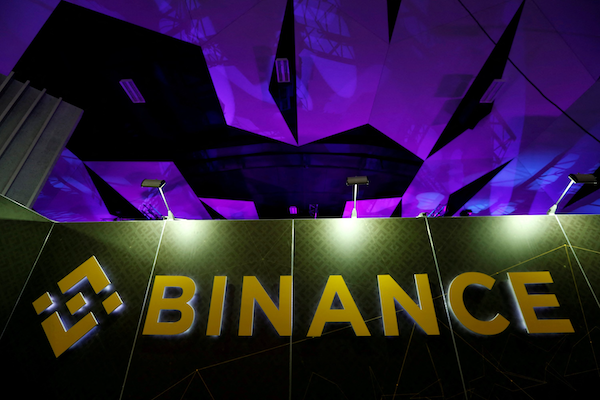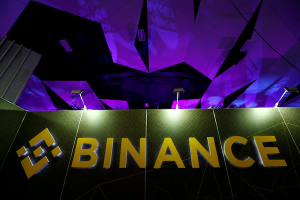Join Our Telegram channel to stay up to date on breaking news coverage
Blockchain data reveals that cryptocurrency firm Binance has handled $8 billion worth of Iranian transactions since 2018 despite U.S. sanctions aimed at cutting off Iran from the world banking system.
According to an analysis of data from renowned U.S. blockchain researcher Chainalysis, almost all the money—roughly $7.8 billion—flowed between Binance and Iran’s biggest cryptocurrency exchange, Nobitex. On its website, Nobitex provides instructions on how to avoid punishment.
Three-quarters of the Iranian assets that went through Binance were invested in Tron, a relatively obscure cryptocurrency that allows users to hide their identities. A mid-tier coin called Tron can be used to trade anonymously without “endangering assets owing to penalties,” according to a blog post published by Nobitex last year.
The fresh discoveries coincide with the U.S. Justice Department’s investigation into alleged money-laundering breaches by Binance, the market leader in the $1 trillion cryptocurrency sector with more than 120 million users. Lawyers and trade-sanctions experts warned that the transactions put the company at risk of breaking American laws prohibiting doing business with Iran.
Reuters reported in July that Binance was still accepting customers from Iran and that the business was aware of the exchange’s popularity in the Islamic Republic. Investigations into Binance’s rocky past with financial regulatory compliance included this one. Binance stated in a blog post the day after that report was published that it abides by international sanctions regulations on Iran and denies access to the platform to anyone residing there. Changpeng Zhao, the billionaire creator of the exchange, wrote on Twitter: “Binance banned Iranian users following sanctions, 7 got missed/found a workaround, they were banned later nevertheless.”
Regarding the newly discovered transactions, Binance declined to provide a thorough response. Patrick Hillmann, a representative, stated in a statement: “Contrary to other platforms that have exposure to the same U.S. sanctioned businesses, Binance.com is not a U.S. firm. We have, however, taken aggressive measures to reduce our exposure to the Iranian market, utilizing internal resources and partners in the business.”
Binance said that clients would no longer be able to register for accounts or use its services without identification starting in August 2021. But as of November of this year, according to Chainalysis statistics, the exchange had handled close to $1.05 billion in trades straight from Nobitex and other Iranian exchanges. Iran-related trades on Binance have totaled about $80 million since Zhao’s post in July.
In the Binance statement, Hillmann stated that the business needs full “Know Your Customer” checks, and Iranian citizens are not allowed to establish or maintain accounts. As we learn about new hazards and potential exposures, we are constantly improving our processes and technologies. Between June 2021 and November 2022, Binance’s exposure to Iranian-linked companies decreased exponentially as a result of these initiatives, which included real-time transaction monitoring in collaboration with external suppliers.”
Billions worth of transfers
According to the data examined, since 2018, over $2.95 billion in cryptocurrency has transferred directly between Iranian exchanges and Binance.
The data also show that an additional $5 billion in cryptocurrency was transferred between Iranian markets and Binance via multiple layers of middlemen. According to regulators, these “indirect” transfers should raise a warning for crypto exchanges as they could be a sign of money laundering and sanction evasion. Cryptocurrency users who want to hide their footprints frequently employ advanced methods to build intricate webs of cryptographic transfers.
On its website, Nobitex advises its 4 million users to “keep security” by avoiding “the direct transfer” of cryptocurrency between Iranian and international crypto platforms.
Regarding the exchange’s indirect exposure to illegal funds, Binance spokeswoman Hillmann stated in June that “what’s essential to note is not where the funds come from – as cryptocurrency deposits cannot be prevented – but what we do after the monies are put.” In order to “guarantee that any unlawful monies are tracked, frozen, recovered, and/or restored to their rightful owner,” he claimed that Binance used transaction monitoring and risk assessments.
The remaining Iranian transactions, besides the Tron token, were made in the well-known cryptocurrencies bitcoin, ether, tether, XRP, and a lesser token called litecoin.
Industry research shows that Binance is the largest market for trading Tron. The coin is not included on certain other significant exchanges, including as the US-regulated Coinbase and Gemini.
Tron has largely escaped the attention of cryptocurrency trackers up until lately. According to an email Chainalysis delivered to a client, the market leader Chainalysis, used by U.S. government agencies, only started offering full support for the tracing of Tron this May.
Since April 2020, when the first Tron flows were tracked, the Tron dataset has information on more than 1.15 million direct transfers between Binance and Nobitex. The information includes wallet addresses and a specific transaction-specific identification number.
Three companies with access to Chainalysis’ Reactor research software provided Reuters with the Tron information as well as additional datasets covering the other crypto coins. It cross-checked the data from each company, and a fourth company, using data from a different dataset created with different software, also validated part of the direct transfer statistics.
The data reveals that more Iranian transactions than any other exchange combined pass through Binance. Since 2018, the Seychelles-based KuCoin exchange has processed $820 million in both direct and indirect transactions, making it the second-most popular exchange for Nobitex customers behind Binance.
Risk of Sanctions
Since its 2017 inception, Binance has experienced rapid growth. Last month, the business broadened its focus beyond cryptocurrencies by contributing $500 million to Elon Musk, the CEO of Tesla, to acquire Twitter.
Whether Binance broke any anti-money laundering laws in the United States is the major subject of the Justice Department’s inquiry. According to three people with knowledge of the investigation, the department is also looking into Binance as part of the case, which has been ongoing since 2018, for potential criminal sanctions violations related to Iran. Late January 2020, the government requested Binance to provide information regarding its compliance program, particularly any documentation pertaining to the movement of cryptocurrency cash for individuals or businesses in nations like Iran.
In accordance with Iran’s nuclear agreement with international powers, the U.S. government eased sanctions on Iran for three years before reinstating them in 2018. Since 1979, sanctions imposed by the West and the UN on Tehran for its nuclear program, as well as for alleged abuses of human rights and support for terrorism, have been in place.
The Iranian transactions reported by Reuters, according to six lawyers and sanctions experts, placed Binance at danger of “secondary” U.S. sanctions, which are meant to stop non-U.S. companies from doing business with sanctioned businesses or assisting Iranians in evading the American trade embargo. A company’s access to the American financial system may be severely restricted by secondary sanctions.
If Binance has what the U.S. Treasury Department refers to as a “nexus to the United States,” the firm may also be subject to direct “primary” sanctions, according to the legal professionals. They stated that these connections may be made with any U.S.-incorporated businesses, transactions carried out using the dollar or the American financial system, or both. An inquiry for feedback from Treasury received no response.
The British bank Standard Chartered agreed to pay over $930 million to American authorities in 2019 for breaking criminal sanctions, which included routing around $240 million through American financial institutions for Iranian clients. Standard Chartered admitted guilt about the transgressions. In 2014, the French bank BNP Paribas consented to pay $8.9 billion and enter a guilty plea to breaking U.S. sanctions on nations like Iran. Both banks declared their intent to enhance their controls.
According to Binance, it does not accept consumers from the US. Instead, American customers are routed to a different exchange called Binance.US, which is operated by a U.S. corporation that has been registered with the Treasury as a money-service business since 2019.
Binance.US has been referred to as a “totally separate entity” by Binance CEO Zhao. It was claimed in October that he actually controlled the American exchange and oversaw its operations from afar. In a note to executives in 2018, a Binance consultant referred to the U.S. operation as a “de facto subsidiary.”
Zhao emphasized that Binance.US “operates independently from Binance.com” in a blog post that was published following that report.
The primary Binance exchange was engaged in the vast majority of the $8 billion in Iranian cryptocurrency transactions that Reuters discovered. However, according to the Chainalysis data, Binance.US also handled $1.5 million worth of cryptocurrency transactions from the Iranian exchanges Nobitex, Wallex, and Tether Land.
The sanctions against Iran can result in criminal penalties of up to $1 million per violation for American organizations. Up to 20 years in prison are possible for those who are involved. The Treasury fined Seattle-based cryptocurrency exchange Bittrex $24 million in October for breaking the sanctions against Iran and other nations by processing transactions totaling more than $260 million in cryptocurrencies. At the time, Bittrex expressed their “pleasure to have totally handled” the situation.
In response to inquiries, a representative for Binance.US claimed that Reuters’ estimates of the amount of its dealings with Iranian exchanges were inaccurate and that adding “direct as well as indirect transactional data from Chainalysis both conflates and inflates the number you quote.” The representative didn’t offer a substitute sum.
According to the spokesman, Binance.US “adheres to all applicable U.S. rules regulating digital asset exchanges” and only allows trade by businesses who have gone through a “rigorous screening procedure.”
Nobitex and the other Iranian cryptocurrency exchanges are not subject to US sanctions. According to Reuters, there is no proof that anyone under sanctions from Iran used Binance or Binance.US.
The Best Choice
The biggest Iranian exchange, Nobitex, debuted in that year. According to his LinkedIn page, the company’s co-founder and CEO, Amirhosein Rad, earned doctorates in chemical engineering and philosophy from Iran’s Sharif University of Technology. For this article, Rad opted not to comment.
Nobitex wants to make it possible for Iranians to invest in cryptocurrencies despite “the shadow of sanctions,” as stated on its LinkedIn page earlier this year. As sanctions have hampered Iran’s capacity to conduct business with the outside world, cryptocurrency has become more and more common there for international trade. According to the exchange, it acts as a “secure bridge between the world of cryptocurrencies and 3.5 million Iranians.”
In its 2021 annual report, Nobitex claimed to handle 70% of all cryptocurrency transactions in Iran. As recently as this year, the exchange encouraged users to utilize Binance in a number of posts on its website and social media accounts.
According to Chainalysis statistics, Nobitex users started transferring bitcoin through Binance in April 2018. Nobitex recommended customers to register accounts to convert their Iranian Rials into cryptocurrency and then make transfers to a foreign exchange like Binance, which it deemed the “most reliable,” in a trading advice on its website that was first published in 2019 and revised this October. Later tweets in 2020 claimed that Binance “causes fewer problems for Iranian users” and that it is “still the best alternative for us Iranians.”
Nobitex’s public conditions of use advise consumers to avoid the “direct transfer” of cryptocurrency from Nobitex to Binance and instead construct numerous digital wallets to move funds in different stages, due to the danger posed by U.S. sanctions.
According to Chainalysis data, the number of Tron transactions between Nobitex and Binance increased starting in August 2020.
The founder of Tron, Sun, announced on Twitter the same month that the digital coin had enabled a new function that allowed traders to conceal their identities. The function, dubbed zk-SNARK, will “secure user data with the greatest privacy protection in the market,” according to Sun.
According to a piece last year that appeared in a journal of the Justice Department, the feature enables the creation of “anonymity enhanced cryptocurrencies” that draw criminals “like sharks to chum” as they “seek out seclusion to disguise their activities.”
Due to Tron’s “excellent security,” Nobitex advised consumers to open digital wallets with Binance in order to purchase it. Zk-SNARK, according to a July 2021 Nobitex blog article, is essential for keeping crypto senders and recipients “secret.”
After Binance tightened its client screening on August 20, 2021, Nobitex customers were still able to utilize Binance to trade Tron and other crypto tokens, according to the data. Between that time and November of this year, Binance conducted direct transactions from Nobitex worth over $1 billion, greatly surpassing any other foreign exchange, the data showed. The data reveals that as late as this October, $20 million in Tron moved straight between Binance and Nobitex.
Nobitex has been utilized by Iranians who have been subject to U.S. Treasury sanctions for engaging in cyberattacks and ransomware operations, according to a Chainalysis analysis from September. According to Chainalysis, over $230,000 in bitcoin ransomware proceeds were transmitted to sanctioned Iranians’ digital accounts between 2015 and 2022, with the majority of the cryptocurrency going to Nobitex.
The Islamic Revolutionary Guard Corps, a potent group that governs an economic empire as well as elite armed and intelligence units in Iran, is reported to be linked with all of the Iranians who were subject to sanctions, according to the Treasury’s statement from the same month. An inquiry for comments was not answered by Iranian authorities. The U.S. sanctions have been dubbed “unilateral, illegal, and brutal” by the Iranian Foreign Ministry.
Related
- Binance Review – Fees, Features, Safety, Pros
- Binance Coin (BNB) Price
- Binance Alternatives – 8 Better Platforms
Join Our Telegram channel to stay up to date on breaking news coverage


